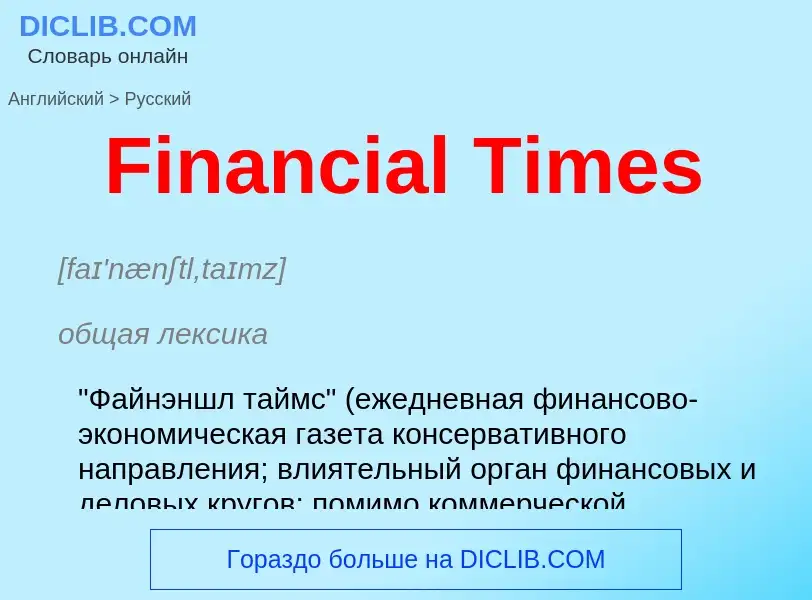Перевод и анализ слов искусственным интеллектом ChatGPT
На этой странице Вы можете получить подробный анализ слова или словосочетания, произведенный с помощью лучшей на сегодняшний день технологии искусственного интеллекта:
- как употребляется слово
- частота употребления
- используется оно чаще в устной или письменной речи
- варианты перевода слова
- примеры употребления (несколько фраз с переводом)
- этимология
Financial Times - перевод на русский
[faɪ'nænʃtl,taɪmz]
общая лексика
"Файнэншл таймс" (ежедневная финансово-экономическая газета консервативного направления; влиятельный орган финансовых и деловых кругов; помимо коммерческой информации публикует тж. материалы по внутриполитическим и международным вопросам; печатается на розовой бумаге; тир. ок. 290 тыс. экз.; издаётся в Лондоне. Основана в 1888)
синоним
[,reɪdɪəu'taɪmz]
общая лексика
"Рейдио таймс" (еженедельный журнал Британской радиовещательной корпорации [British Broadcasting Corporation]; публикует программы теле- и радиопередач Би-би-си [BBC], а тж. телепередач Независимого телевидения [Independent Television]; тир. ок. 3 млн. экз.; издаётся в Лондоне. Основан в 1923)
Определение
Википедия
The Financial Times (FT) is a British daily business newspaper printed in broadsheet and published digitally that focuses on business and economic current affairs. Based in London, England, the paper is owned by a Japanese holding company, Nikkei, with core editorial offices across Britain, the United States and continental Europe. In July 2015, Pearson sold the publication to Nikkei for £844 million (US$1.32 billion) after owning it since 1957. In 2019, it reported one million paying subscriptions, three-quarters of which were digital subscriptions. The newspaper has a prominent focus on financial journalism and economic analysis rather than generalist reporting, drawing both criticism and acclaim. It sponsors an annual book award and publishes a "Person of the Year" feature.
The paper was founded in January 1888 as the London Financial Guide before rebranding a month later as the Financial Times. It was first circulated around metropolitan London by James Sheridan, who, along with his brother and Horatio Bottomley, sought to report on city business opposite the Financial News. The succeeding half-century of competition between the two papers eventually culminated in a 1945 merger, led by Brendan Bracken, which established it as one of the largest business newspapers in the world. Globalisation from the late 19th to mid-20th centuries facilitated editorial expansion for the FT, with the paper adding opinion columns, special reports, political cartoons, readers' letters, book reviews, technology articles and global politics features. The paper is often characterised by its light-pink (salmon) newsprint. It is supplemented by its lifestyle magazine (FT Magazine), weekend edition (FT Weekend) and some industry publications.
The editorial stance of the Financial Times centres on economic liberalism, particularly advocacy of free trade and free markets. Since its founding it has supported liberal democracy, favouring classically liberal politics and policies from international governments; its newsroom is independent from its editorial board, and it is considered a newspaper of record. Due to its history of economic commentary, the FT publishes a variety of financial indices, primarily the FTSE All-Share Index. Since the late 20th century, its typical depth of coverage has linked the paper with a white-collar, educated, and financially literate readership. Because of this tendency, the FT has traditionally been regarded as a centre to centre-right liberal, neoliberal, and conservative-liberal newspaper. The Financial Times is headquartered in Bracken House at 1 Friday Street, near the city's financial centre, where it maintains its publishing house, corporate centre, and main editorial office.



![market indices]], 2019 market indices]], 2019](https://commons.wikimedia.org/wiki/Special:FilePath/Indices Financial Times.jpg?width=200)
![Russian president [[Vladimir Putin]] being interviewed by [[Lionel Barber]] and Henry Foy of the ''Financial Times'' in 2019 Russian president [[Vladimir Putin]] being interviewed by [[Lionel Barber]] and Henry Foy of the ''Financial Times'' in 2019](https://commons.wikimedia.org/wiki/Special:FilePath/Vladimir Putin with The Financial Times (2019-06-27) 07.jpg?width=200)

.png?width=200)

![BBC's coat of arms]] with the motto: "Nation shall speak peace unto nation" BBC's coat of arms]] with the motto: "Nation shall speak peace unto nation"](https://commons.wikimedia.org/wiki/Special:FilePath/Radio Times 1931 (masthead).jpg?width=200)
